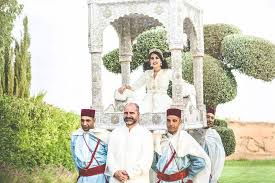The Rich Tapestry of Moroccan Traditions
Morocco, a land of vibrant colours, intricate patterns, and warm hospitality, is steeped in rich traditions that have been passed down through generations. From the bustling medinas to the tranquil riads, Moroccan traditions shape every aspect of daily life in this North African country.
Berber Roots
One of the foundational elements of Moroccan culture is its Berber heritage. The Berbers, an indigenous ethnic group in North Africa, have influenced Moroccan traditions for centuries. From their unique language and music to their distinctive clothing and jewellery, Berber culture is an integral part of Morocco’s identity.
Moroccan Cuisine
No exploration of Moroccan traditions would be complete without delving into its world-renowned cuisine. The tantalising flavours of tagines, couscous, and mint tea reflect the country’s diverse history and geography. Spices such as cumin, saffron, and cinnamon infuse Moroccan dishes with a depth of flavour that is unmatched.
Festivals and Celebrations
Throughout the year, Moroccans come together to celebrate a myriad of festivals that showcase their cultural heritage. From the vibrant colours of the Fes Festival of World Sacred Music to the lively street performances during Mawazine Music Festival, these events offer a glimpse into the soul of Morocco.
Artisanal Crafts
Moroccan artisans are masters of their craft, creating intricate pottery, textiles, and metalwork that are sought after around the world. The geometric patterns and bold colours found in traditional Moroccan rugs, ceramics, and leather goods are a testament to the skill and artistry passed down through generations.
Hospitality and Tea Culture
Moroccans are known for their warm hospitality and love for sharing a cup of mint tea with guests. The ritual of preparing and serving tea is steeped in tradition, with each step symbolising friendship and respect. This timeless custom embodies the essence of Moroccan culture.
Conclusion
Exploring Moroccan traditions is like embarking on a sensory journey through time. From the ancient customs rooted in Berber culture to the modern interpretations seen in contemporary art and music, Morocco’s traditions continue to captivate visitors from around the globe. Immerse yourself in this tapestry of tradition and discover the magic that defines Morocco.
Embracing the Vibrant Tapestry: The Richness of Moroccan Traditions and Cultural Splendour
- 1. Rich cultural heritage rooted in Berber, Arab, and European influences.
- 2. Exquisite craftsmanship displayed in traditional Moroccan art and architecture.
- 3. Diverse culinary delights ranging from aromatic tagines to sweet pastries.
- 4. Colourful festivals and celebrations that showcase the vibrancy of Moroccan culture.
- 5. Warm hospitality and tea rituals that make guests feel welcome and cherished.
- 6. Intricate textile designs and patterns that reflect Morocco’s artistic prowess.
- 7. Time-honoured customs passed down through generations, preserving authenticity.
- 8. Lively music and dance performances that embody the spirit of Moroccan traditions.
Five Critical Challenges of Moroccan Traditions: From Gender Inequality to Restrictive Cultural Norms
- Gender inequality is prevalent in many Moroccan traditions, with women often having limited rights and opportunities.
- Some traditional practices, such as child marriage and female genital mutilation, are harmful and violate human rights.
- Moroccan traditions can sometimes reinforce social hierarchies, leading to divisions within communities.
- Certain traditional beliefs may hinder progress and modernisation in certain sectors of Moroccan society.
- The pressure to conform to strict cultural norms can limit individual expression and personal freedoms.
1. Rich cultural heritage rooted in Berber, Arab, and European influences.
Moroccan traditions boast a rich cultural heritage deeply intertwined with a diverse tapestry of influences from Berber, Arab, and European origins. This unique blend of heritage has shaped Morocco’s customs, art, cuisine, and architecture, creating a vibrant and multifaceted society that celebrates its historical roots while embracing the complexities of its past. The fusion of these diverse influences has given rise to a dynamic and colourful culture that continues to enchant and inspire visitors from around the world.
2. Exquisite craftsmanship displayed in traditional Moroccan art and architecture.
The exquisite craftsmanship displayed in traditional Moroccan art and architecture is a testament to the country’s rich heritage and artistic prowess. From the intricate geometric patterns adorning mosques and palaces to the vibrant colours woven into traditional textiles and ceramics, Moroccan artisans showcase a level of skill and precision that has been honed over centuries. Each piece tells a story of cultural significance, blending Berber, Arab, and European influences to create a unique aesthetic that captivates the senses and leaves a lasting impression on all who behold it.
3. Diverse culinary delights ranging from aromatic tagines to sweet pastries.
One of the captivating aspects of Moroccan traditions is the diverse array of culinary delights that tantalize the taste buds. From fragrant tagines simmering with tender meats and aromatic spices to decadent sweet pastries dripping with honey and nuts, Moroccan cuisine is a feast for the senses. Each dish tells a story of centuries-old recipes passed down through generations, reflecting the rich tapestry of flavours that define Morocco’s gastronomic heritage.
4. Colourful festivals and celebrations that showcase the vibrancy of Moroccan culture.
One of the captivating aspects of Moroccan traditions is the array of colourful festivals and celebrations that bring to life the vibrancy and richness of Moroccan culture. From the rhythmic beats of traditional music to the kaleidoscope of hues adorning elaborate costumes and decorations, these festivities serve as a vibrant tapestry that showcases the diversity and spirit of Morocco. Whether it’s the lively street parades during Mawazine Music Festival or the enchanting performances at the Fes Festival of World Sacred Music, these celebrations offer a glimpse into the heart and soul of Moroccan traditions, inviting locals and visitors alike to immerse themselves in a world of joy, unity, and cultural pride.
5. Warm hospitality and tea rituals that make guests feel welcome and cherished.
Moroccan traditions are renowned for their warm hospitality and cherished tea rituals, creating an atmosphere where guests feel truly welcomed and valued. The art of preparing and serving mint tea is a time-honoured practice that symbolises friendship and respect in Moroccan culture. From the first sip to the last, guests are enveloped in a sense of belonging and appreciation, making every interaction a memorable and heartwarming experience.
6. Intricate textile designs and patterns that reflect Morocco’s artistic prowess.
Moroccan traditions boast intricate textile designs and patterns that serve as a testament to the country’s artistic prowess. From vibrant carpets woven with geometric motifs to delicate embroidery adorning traditional garments, Morocco’s textile heritage showcases a fusion of creativity and skill. These intricate designs not only beautify everyday objects but also carry symbolic meanings, reflecting the rich cultural tapestry of Morocco. The meticulous craftsmanship behind these textiles highlights the dedication and talent of Moroccan artisans, preserving age-old techniques and ensuring that each piece tells a story of tradition and artistry.
7. Time-honoured customs passed down through generations, preserving authenticity.
One of the enduring strengths of Moroccan traditions lies in the time-honoured customs that have been carefully passed down through generations, ensuring the preservation of authenticity. These cherished practices, whether in the art of traditional craftsmanship, culinary rituals, or festive celebrations, serve as a living link to Morocco’s rich cultural heritage. By upholding these customs with reverence and care, Moroccans not only honour their ancestors but also maintain the authenticity and essence of their identity in a rapidly changing world.
8. Lively music and dance performances that embody the spirit of Moroccan traditions.
Lively music and dance performances are a vibrant pro of Moroccan traditions, encapsulating the essence and spirit of the country’s rich cultural heritage. From the rhythmic beats of traditional drums to the mesmerising movements of belly dancers adorned in colourful attire, Moroccan music and dance bring communities together in joyous celebration. These performances not only entertain but also serve as a powerful expression of Morocco’s history, values, and unity, showcasing the beauty and diversity of the nation’s artistic traditions.
Gender inequality is prevalent in many Moroccan traditions, with women often having limited rights and opportunities.
Gender inequality remains a significant challenge within many Moroccan traditions, perpetuating a system where women are frequently deprived of equal rights and opportunities. From restrictions on education and employment to limited decision-making power within households, women in Morocco often face systemic barriers that hinder their personal and professional growth. Addressing this issue is crucial to creating a more inclusive society that values the contributions and potential of all its members, regardless of gender.
Some traditional practices, such as child marriage and female genital mutilation, are harmful and violate human rights.
Certain aspects of Moroccan traditions, notably practices like child marriage and female genital mutilation, stand as stark reminders of the challenges faced in upholding human rights. These harmful customs not only perpetuate gender inequality but also infringe upon the fundamental rights and well-being of individuals, particularly young girls and women. Addressing these issues requires a collective effort to promote awareness, education, and advocacy for the eradication of such harmful practices in order to create a more just and equitable society for all.
Moroccan traditions can sometimes reinforce social hierarchies, leading to divisions within communities.
Moroccan traditions, while deeply rooted in cultural heritage, can inadvertently perpetuate social hierarchies and create divisions within communities. Practices such as familial expectations based on gender roles, hierarchical structures in religious ceremonies, and traditional customs that favour certain societal classes can contribute to inequalities and tensions among community members. These entrenched traditions may limit individual freedoms and reinforce power dynamics that hinder social cohesion and inclusivity. It is important for Moroccan society to critically examine these aspects of tradition to promote a more equitable and harmonious community for all its members.
Certain traditional beliefs may hinder progress and modernisation in certain sectors of Moroccan society.
Certain traditional beliefs in Moroccan society may act as a barrier to progress and modernisation in certain sectors. For example, rigid adherence to age-old customs and practices could impede the adoption of new technologies or innovative approaches in industries such as agriculture or education. While preserving cultural heritage is important, finding a balance between tradition and advancement is crucial for Morocco to thrive in a rapidly changing world. Addressing these challenges requires careful consideration and open dialogue to ensure that traditions evolve in a way that benefits all facets of society.
The pressure to conform to strict cultural norms can limit individual expression and personal freedoms.
In Morocco, the deeply ingrained traditions and societal expectations can create a conundrum for individuals seeking to express their individuality and exercise personal freedoms. The pressure to adhere to strict cultural norms may stifle creativity, diversity, and the ability to explore one’s own beliefs and values freely. This constraint on individual expression can lead to a sense of conformity that hinders personal growth and limits the opportunity for self-discovery. Balancing respect for tradition with the need for personal autonomy remains a challenge in navigating the complexities of Moroccan society.




